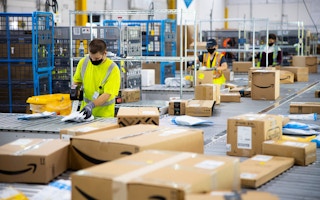Over the last 10 months or so, large parts of the world have stopped. Amazon’s delivery vans on the other hand, have not. In fact, they’ve worked like a well-oiled machine, a precise and efficient army, delivering package after package all over the world, on time.
To continue reading, subscribe to Eco‑Business.
There's something for everyone. We offer a range of subscription plans.
- Access our stories and receive our Insights Weekly newsletter with the free EB Member plan.
- Unlock unlimited access to our content and archive with EB Circle.
- Publish your content with EB Premium.
The surge in online shopping was a significantly big battle, which they have managed to win, with most of us receiving our purchases safely at home.
Who lost? Well, once again, it was the environment. And this week, the non-profit ocean conservation organisation Oceana, released a new report that unveiled Amazon’s plastic problem.
In 2019, the report says, Amazon was responsible for the use of an estimated 465 million pounds (211 million kilograms) of plastic packaging. This included air pillows, bubble wrap, and other plastic packaging items. The study found that Amazon’s estimated plastic packaging waste, in the form of air pillows alone, would circle the Earth more than 500 times.
By combining Amazon’s packaging data with findings from a recent study published in Science, the report estimates that up to 22.44 million pounds (10.2 million kilograms) of Amazon’s plastic packaging waste entered and polluted the world’s freshwater and marine ecosystems in 2019 alone. This is the equivalent of dumping a delivery van payload of plastic into the oceans every 70 minutes.
The worst part? Amazon promotes the “recyclability” of its packaging. But most plastic is not recycled. This is for the simple reason that the company’s plastic packaging has little to no value on the recycling market. Most municipal recycling programmes in the US, Canada, and the UK do not accept plastic film, the type of plastic used in Amazon’s packaging.
It is also important to remember that the above figures are for 2019, when Amazon shipped approximately 7 billion packages worldwide. This is equivalent to nearly one package for every person living on Earth. Imagine what the 2020 numbers will be like, with Amazon’s sales up 40 per cent in both Q2 and Q3…
What do we say?
Despite Amazon’s very public push for sustainability, the company does not disclose its plastic footprint. This type of behaviour is not uncommon. For example, a recent study from Arabesque S-Ray showed that companies that are better at reporting their CO2 emissions are also better at managing them, and vice versa.
In order to have a more holistic view of Amazon, we zoomed out, and looked at the company’s overall sustainability performance. The picture is not the one we would have expected, given the company’s aforementioned sustainability push. Amazon has an Arabesque S-Ray ESG score of just 51.59/100*, ranking it in the bottom 48 per cent of companies in the retail trade sector. It is interesting to note that governance is the only above average sub-score (60.49/100*). The company underperforms on both the environmental and social dimensions, with sub-scores of 44.92/100* and 45.47/100* respectively.
Also, Amazon’s carbon footprint is far from impressive. The tech giant has a long term (2050) temperature score of 2.7°C, meaning that it is not aligned with the Paris Agreement.
No matter how loud you are, numbers don’t lie!
What does it mean?
Amazon’s use of plastic packaging is highly problematic because it increases plastic use, plastic waste, and pollution. Furthermore, plastics are made from fossil fuels and are a major contributor to climate change. It is common for life cycle assessments that favour plastic, to not consider the material’s full environmental impact, particularly on the oceans.
Plastic is a major source of pollution for the world’s oceans, since it harms marine life and biodiversity. Sea turtles and other animals mistake the kind of plastic used by Amazon for food. Recent studies estimate that 90 per cent of all seabirds and more than half of all sea turtle species have ingested plastic.
Amazon must take immediate steps to reduce the use of plastic and support governments to enact meaningful reduction measures, rather than simply talking about recycling. Given its proven ability to innovate, the tech giant should focus its resources in developing and rolling out plastic-free packaging.
Time to build a new army!
*Source: Arabesque S-Ray, data as of 17th December 2020.
Arabesque is a global group of financial technology companies offering sustainable investment, advisory, and data services through advanced ESG and AI capabilities.









